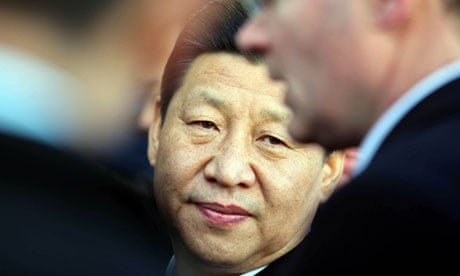Some use tea leaves to read the future. In Beijing, we prefer more serious means, such as horticultural displays and hotel bookings.
Some time soon, the Communist party of China will formally mark the transition of power from one generation of leaders to the next, at the 18th party congress. For almost a decade – since the last handover – it has been widely assumed the event will take place in autumn 2012.
Yet such is the secretive nature of the leadership in the world's second-largest economy that precise dates remain a mystery.
In the past month or so, a series of clues – from the postponement of a marathon to block bookings at hotels often used by officials – strongly suggested that the opening was set for mid-October. Yet as the end of September approaches, authorities have yet to make a formal announcement, leaving many wondering whether the meeting has been pushed back. The official line is that it will take place "in the second half of 2012".
Now giant floral signs welcoming the 18th party congress have appeared along major roads in the capital. Absurd as it may be, that is one of the best indications yet that leaders are on course for a gathering within weeks.
"The floral arrangements are yet another indication that we're getting closer, but we still can't say with confidence when it's going to kick off – or how long it's going to take," said Russell Leigh Moses, dean of the Beijing Centre for Chinese Studies. "It's standard, for Chinese politics, not to know precisely what's transpiring until it's convenient for the information to be conveyed."
China watchers now know vastly more about the lives of ordinary people than ever before. Yet the country's version of Kremlinology – Zhongnanhaiology, after the vermilion-walled compound where its leaders live and work – has in some ways advanced little since the mid-70s, when a (now declassified) CIA guide asked: "Does logic help?"
"It may seem ridiculous to others … that some China watchers have noticed a remarkable correlation between those Chinese leaders who wear sunglasses in public and those who eventually lose their jobs," noted the author. "That is, after all, the unique feature of the China-watching business: there are almost no clues that are not worth following up."
True, this year has seen an unusual flood of stories about high-level dealings, notably concerning the toppling of the former leader Bo Xilai and the conviction of his wife, Gu Kailai, for murdering the British businessman Neil Heywood. But while some have proved correct, many have proved false; others are impossible to confirm or deny. The sheer multiplicity of rumours surrounding the heir apparent Xi Jinping's recent disappearance from the public gaze showed that most of those who claim – and perhaps believe – they know the truth either do not, or are spinning.
"The biggest lesson from this story … is how limited a view any of us have to what's going on and how the most lurid rumours can gain currency and circulation in the absence of confirmed fact," argued David Schlesinger, a former China correspondent and former Thomson Reuters China chairman, in a speech on foreign reporting on China this week.
As Moses points out: "In Chinese politics this year, a lot of the bets have proven to be off. There's no reason to think anyone has any clear idea where to put their cash down in terms of when this congress starts."
Particularly since the Beijing Municipal Bureau of Landscape and Forestry has declined to reveal when the floral signs will be removed.

Comments (…)
Sign in or create your Guardian account to join the discussion